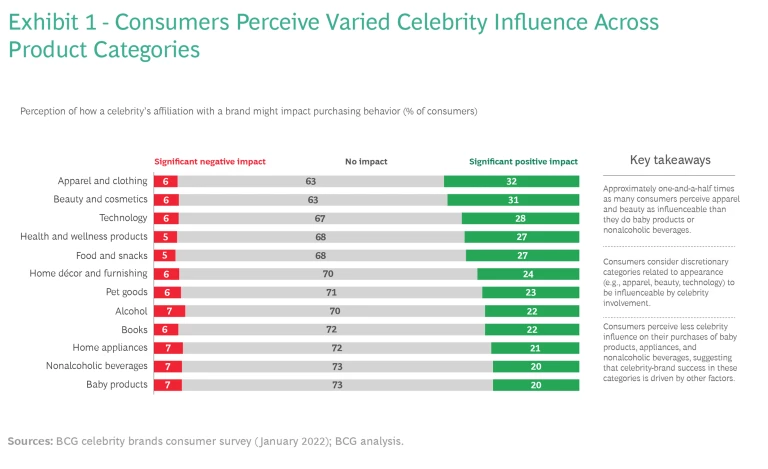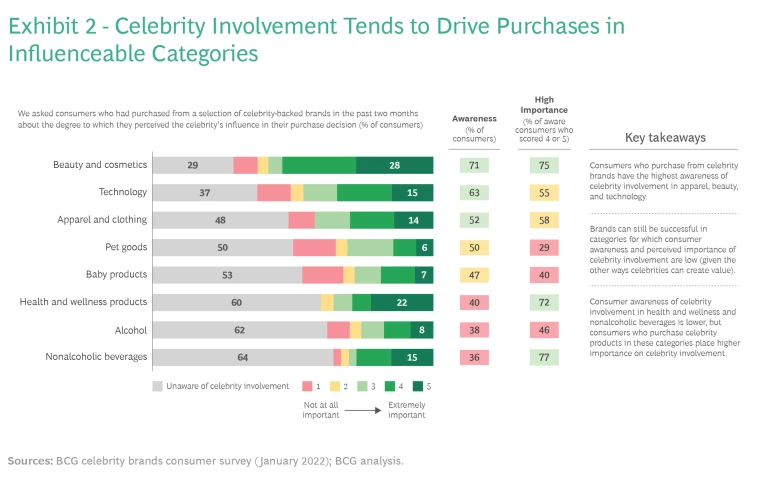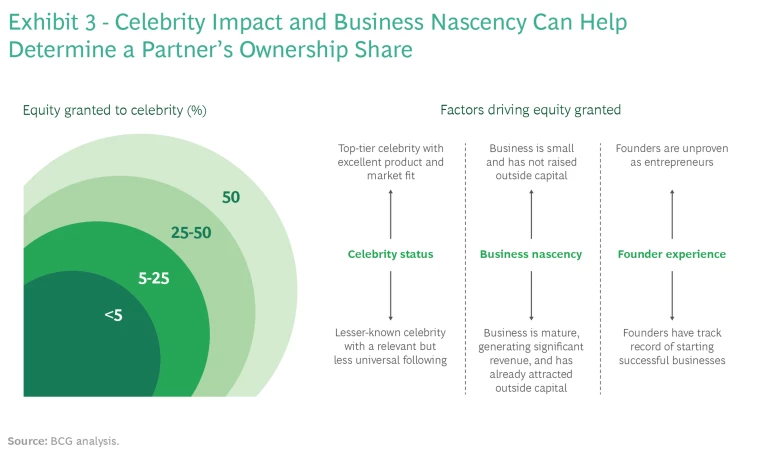The following piece was written in collaboration with Caravan, which cofounds companies authentically powered by the world’s most iconic artists and athletes. Caravan provided critical insights and arranged expert interviews to shed light on the current state of celebrity-brand partnerships. As of the date of publication, Caravan has no existing financial relationship with any of the celebrities or brands mentioned herein.
The right celebrity relationship can offer tremendous value, but businesses should carefully evaluate their unique set of circumstances before diving in.
In its first decade, Aviation Gin was a highly successful craft distillery, but in terms of consumer products, it wasn’t yet a household name. Then, in 2018, actor Ryan Reynolds acquired a significant ownership stake and took a leading role in the business, leveraging his celebrity status to make deals that were critical to the brand’s continued success and to spearhead new promotional efforts. One year later, sales had increased substantially, and in 2020, multinational beverage giant Diageo purchased the company for $610 million. Notably, the actor’s engagement brought greater attention not only to Aviation but also to the broader gin market, which has grown substantially since the actor came on board.
Such celebrity involvement with brands may seem like a hallmark of the modern era, but producers of consumer goods have for centuries looked to famous individuals to build brand awareness and promote their products.
Celebrity endorsements probably date to the 1760s, when noted British potter Josiah Wedgwood—known also for his pioneering marketing techniques, such as the money-back guarantee—received permission from the Crown to sell his porcelain as “Queensware.” From there, Wedgwood went on to name his pottery pieces after specific members of the nobility.
Today, the relationship between consumer products and celebrities runs much deeper and is more nuanced than many realize. This article focuses on celebrity partnerships (rather than simple endorsements), which can represent an enormous source of value, especially for emerging brands trying to gain a foothold in a crowded arena. Venture capitalists are increasingly betting on celebrity-backed startups, and private equity firms are seeing valuation multiples rise at companies collaborating with celebrities. Meanwhile, an oversaturated marketplace and expanding privacy laws are forcing brands to rethink the way they can grow, differentiate themselves, and acquire new customers.
Venture capitalists are increasingly betting on celebrity-backed startups.
A recent uptick in partnerships formed between brands and celebrities suggests that both parties are keenly aware of the potential benefits. In fact, since the onset of the pandemic alone, more than 40 celebrity-backed beauty brands have been announced or funded, according to Beauty Independent, an online publication focused on cosmetics entrepreneurs.
To shed light on the challenges, complexities, and opportunities that come with celebrity partnerships, we interviewed a number of founders and executives who have experience cultivating these relationships. We also conducted a study of approximately 6,000 consumers to find out what resonates most with them and where brands can create the greatest impact. Our research suggests that celebrity partnerships are a critical part of the evolving consumer-brand landscape, but they require businesses to carefully evaluate their unique set of circumstances to determine how much value that working with a celebrity can provide.
A Shifting Landscape—And Continued Opportunity
The consumer products marketplace is increasingly competitive, congested, and fragmented. Forging partnerships with celebrities, therefore, can take a variety of forms, and they require careful consideration from all parties involved.
Investors, for example, have been encouraged by numerous proof points of successful collaborations that led to lucrative deals, according to BCG research. They also tend to perceive celebrity-brand partnerships as relatively low risk.
Celebrities, for their part, are increasingly aware that brand partnerships offer the opportunity to diversify their personal wealth and create a deeper connection with fans. Celebrities are often passionate about their company’s mission and products; they are proud owners who want to use their platform to spread awareness as far as possible. In the age of widespread social media, which affords consistent and direct access to fans, many celebrities have been able to take greater control of their individual brands. They, too, are looking for ways to differentiate themselves and stay relevant in a world where more and more individuals have a far-reaching voice and the ability to reach broad audiences.
Celebrities are often passionate about their company’s mission and products; they are proud owners who want to use their platform to spread awareness as far as possible.
Brands must account for today’s constantly evolving consumption trends brought on by the pandemic and growing e-commerce capabilities. More than ever, companies are having to navigate wide-ranging diversity in their customers’ mindsets and choices. Meanwhile, new privacy laws restricting the collection of users’ data online is increasing customer acquisition costs, making it harder than ever for brands to learn about their social media targets.
It’s no surprise, then, that businesses are having to rethink many fundamentals, including how they retail products, acquire customers, and grow their market share. Each business is looking for ways to make its products stand out, whether on physical shelves or in digital aisles. They’re angling for shoppers’ divided attention and trying to promote new offerings that consumers may have missed since the pandemic began.
Celebrity involvement can help address the challenges facing the consumer product space. Partnering with a celebrity means extending the brand’s reach and appealing to a broader base of consumers—critical sources of competitive advantage. Celebrity partners lend brands a sense of cultural prestige, signifying to audiences that the brand partnership carries the same weight as the celebrity’s other projects. What’s more, a well-known public figure can turn out to be a savvy, well-resourced advisor who can leverage social and commercial networks to benefit the business.
Brands would be wise to carefully weigh their options before diving headfirst into such a potentially game-changing partnership.
But brands would be wise to carefully weigh their options before diving headfirst into such a potentially game-changing partnership. Company leaders should ask themselves: Is the potential value gained worth the equity lost? Who will take the brand the greatest distance? These are just some of the many questions companies must weigh when deciding if a partnership is right for them.
What to Look for in a Partner
Before choosing to partner with a celebrity and charting a course for the relationship, businesses should consider what’s best for their unique business context and product portfolio. Thankfully, there are certain universal qualities that every brand can look for in a celebrity partner, including the following:
Business Savvy. It’s no surprise that celebrities who have experience working with brands or have otherwise established themselves as savvy business thinkers are the safest bet for partnering. This is especially true for startups or younger brands that could benefit from a partner’s experience—be it related to a product, marketing, strategy, or even operations—and existing business connections.
Willingness to Engage. Brands should work with individuals who are known for being engaged, passionate, and willing to take an active role in developing the business. Practically speaking, brands should ensure that any partner will work well with their teams, thus building positive momentum with minimal friction. Equally important is finding a celebrity who has the bandwidth to take on a new project and sufficient time to make it a priority.
Passion for the Product. Consumers react more positively if they believe that the celebrities they see supporting a product know what they are talking about and believe in what they are selling. Authenticity and trust are key; recognizability and physical attractiveness won’t necessarily translate into greater brand consideration and higher sales volumes. This is true across product categories and consumer demographics. Consumers are twice as likely to be positively influenced by celebrities they trust and find authentic than those they consider likable. They are three times as likely to be positively influenced by these characteristics than by physical attributes.
Social Following. Exposure and reach are key to building brand awareness and attracting new customers—but bigger isn’t necessarily better. Celebrities with relatively smaller followings can sometimes be the most effective partners, given their accessibility as well as their willingness and availability to put in greater effort. For example, microinfluencers—who have relatively niche followings—can make a large impact because their fans are typically very engaged. Big stars can’t always achieve such diehard fandom.
Eyes Open
Partnering with a well-known and highly recognizable individual doesn’t guarantee value. We’ve all seen it happen—how a celebrity’s single errant comment, poorly received public interaction, hasty social media post, or well-intentioned faux pas can sour the mood on a beloved figure literally overnight. Such events can quickly turn into public relations nightmares for partner brands, regardless of whether the brand itself was involved.
Additionally, if the celebrity isn’t business-minded, has a volatile lifestyle, or doesn’t meaningfully engage with the partnership, the collaboration is unlikely to succeed. Working with the wrong partner can even slow down critical decisions or result in choices that damage the brand’s reputation.
Working with the wrong partner can slow down critical decisions or result in choices that damage the brand’s reputation.
That is why brands should consider whether it makes more sense to keep one celebrity on indefinitely or to work with several. Codifying flexible ownership agreements that allow for new partners to join at a later point might be an effective hedge against some of the issues noted above.
Finally, and critically, consumer products companies should recognize the limitations of their partnerships. Even with the most business-minded, hardworking, and experienced partners at their side, brands will succeed or fail based on the quality of their products and the effectiveness of their business models. Companies that see a celebrity’s involvement as a panacea for their organization’s ills will be sorely disappointed—and waste precious resources in the pursuit.
Know Thyself
Before choosing to partner with a celebrity—or determining what they are willing to cede to this partnership—consumer companies should carefully evaluate their product portfolio and the business context in which they operate.
Product Portfolio. We surveyed approximately 6,000 consumers and found that they perceive the effects of a celebrity’s brand involvement differently, depending on the product category. (See Exhibit 1.)
Generally, consumers’ awareness of celebrity involvement with a brand tends to drive sales in those categories considered influenceable. (See Exhibit 2.)
Celebrities can most positively affect consumers’ perception of apparel and beauty products, according to the research, especially when consumers trust the celebrity’s expertise, experience, and ability to speak on behalf of these products. Rihanna’s Fenty Beauty, for example, outperforms much of the non-celebrity-backed competition in brand awareness, customer loyalty, and customer retention. Likewise, singer-songwriter Lizzo has recently partnered with clothing company Fabletics to launch Yitty, a brand focused on providing shapewear for all body types. Although just launched in 2022, the brand has already gained widespread positive attention and strong critical reviews.
Brands offering lesser-known products or introducing new product categories can also benefit. Startup founders, in particular, have the opportunity to leverage celebrities’ ability to explain unfamiliar concepts to audiences who know and trust them. Actor Kevin Costner recognized his value when he signed on as a cofounder of the audio-entertainment app HearHere. Hardly a familiar concept, HearHere uses a road-tripper’s location to provide vignettes—read by Kevin Costner and other celebrities—detailing the history of the place. Launched during the pandemic, the app has already raised $3.2 million in seed funding this year. Meat-alternative brands have found similar success in expanding their customer base with multiple celebrity collaborations.
Startup founders, in particular, have the opportunity to leverage celebrities’ ability to explain unfamiliar concepts to audiences who know and trust them.
At the other end of the spectrum are durable goods. When it comes to higher-cost, more-permanent products, consumers like to do their own research and consider a wider variety of factors before making a purchase. The same is true for baby products—the category for which consumers are least susceptible to celebrity influence—owing to the sensitive, high-stakes nature of this consumption decision. Some perform well in these categories when partner celebrities add value in ways beyond direct consumer influence.
Business Context. Once you’ve identified the right partner for your business, how do you reap the benefits? What unique opportunities might the person bring to the table? Brands should look to capitalize on the following benefits of their new partnership:
- Opened Doors. Having a recognizable name attached to a brand can generate interest and excitement among top-tier suppliers and other third parties that are critical to business operations.
- Channel Partnerships. Gaining access to key channels is no small feat in the crowded consumer products space. But big-box chains and other retailers are more likely to grant favorable payment terms, product rollouts, and more valuable real estate (aisle endcap displays, for example) to celebrity-backed brands they can get excited about.
- Capital. Investors see celebrities as a significant business asset and as a source of higher returns. Brands should not underestimate this wow factor when trying to raise more funding.
- Lowered Customer Acquisition Costs. Thanks to their star power and broad appeal, not to mention their established ability to win over audiences, celebrities provide a means for piquing consumers’ interest and lessen the need to carefully target specific groups. They can appeal to followers on social media and through exclusive marketing channels, such as talk shows, sports events, and beyond.
- Higher Customer Retention and Deeper Engagement. Thanks to increasing privacy regulations and mercurial consumer behaviors, it’s getting much harder for brands to learn what matters most to current and potential purchasers of their products and to target those demographics accordingly. Celebrities can become powerful conduits for reaching audiences, reminding them what they loved about a brand in the first place and reenergizing them to take a second look.
It’s getting much harder for brands to learn what matters most to current and potential purchasers of their products.
Brass Tracks
Brands might owe a debt of gratitude to Josiah Wedgwood for his bravado and marketing genius, but his “partnership” with the Crown offers little insight for today’s businesses. Queen Charlotte was a patron of the arts who had little need for a portion of the potter’s profits. Today’s sellers should be so lucky.
Indeed, perhaps the biggest consideration for consumer products companies is the nature of the arrangement itself. Brands—and especially startups—have to weigh the pros and cons of bringing on a partner who might have a different vision for the business and will certainly expect to reap the rewards of its success. They must ask themselves what they need and what they are willing to give up.
Not all celebrity partnerships are created equal. Depending on the circumstances—including the brand’s position in the marketplace and a celebrity’s particular interests—it might make sense to establish a partnership from the outset. Some celebrities might be willing to join a company in its infant stages as a cofounder, as Kevin Costner did. Others might prefer to expand the reach of an already established brand. Likewise, some celebrities might be interested in earning sweat equity—appearing in advertisements, for example—while others could be looking to invest more passively, thereby increasing the company’s perceived value.
The more mature a brand, the less direct influence the celebrity can have on its success.
Because there are many ways that a celebrity can be catalytic to a brand, startups or newer entrants might be uncertain about the best approach. Our research suggests that, for those in doubt, offering part ownership is a solid choice. There are two key reasons. First, since partners generate the greatest value when they are committed and engaged, invested equity owners will more likely wake up every day thinking about how they can help grow the brand. Second, the less proven the growth trajectory, and the younger the business, the more ways the celebrity can effect change—and the bigger the long-term upside.
From the celebrity’s perspective, the lure of equity is probably most attractive if the company is at an early stage, when the celebrity’s stake could potentially grow dramatically. The more mature a brand, the less direct influence the celebrity can have on its success. And being further down the risk-reward spectrum may be less compelling for a celebrity seeking to diversify sources of personal wealth creation. The question for brands, of course, is how much of a stake they should be willing to give away. This depends on several factors, but the basic equation comes down to balancing growth needs with a celebrity partner’s potential impact. (See Exhibit 3.)
For a lesser-known brand hoping to land a widely known, successful business partner, for example, it might be worth ceding a substantial portion of equity—and even paying an upfront fee. For established players looking to increase their already far reach with the help of a household name, it makes less sense to give away significant ownership.
Celebrity partnerships can unlock many, sometimes far-reaching, benefits for new and emerging brands seeking a competitive edge in the market. But before deciding if a celebrity partner is right for them, companies should carefully navigate the complexities of such an arrangement. Who will take your business the furthest? What is this partnership worth to you? Answering such questions is an essential first step toward reaping significant rewards.









